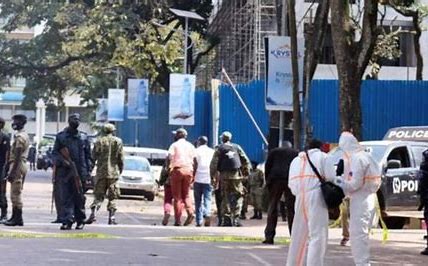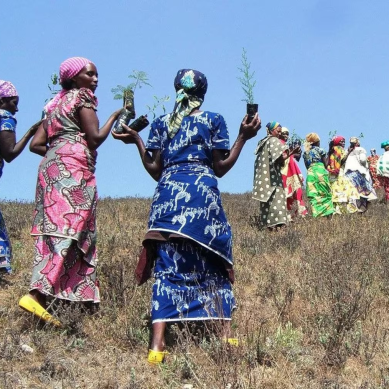
Two explosions rocked Uganda’s capital, Kampala, on Tuesday, killing at least three civilians in what police described as a coordinated attack by extremists opposed to the government.
Police also confirmed on Tuesday evening that the three suicide bombers died in the blasts, while the fourth was arrested while trying to escape. The explosions caused chaos in Kampala as terrified residents fled the city’s center.
“The bomb threats are still active, especially from suicide attackers,” police spokesman Fred Enanga said, blaming the blasts on the Allied Democratic Forces, an Islamic extremist group.
The twin explosions occurred within three minutes of each other. Both were carried out by attackers carrying explosives. A possible attack on a third target was foiled by police who pursued and disarmed a suspected suicide bomber, Enanga said.
Police released security video footage of the precise moments the bombers detonated their devices in the streets, sending clouds of white smoke billowing in the air.
“We give thanks to God. He has protected us,” said eyewitness Jane Among near one of the blast scenes. “We first heard a blast, and then after a little while, we heard another blast and saw dust all over.”
One blast was near a police station and the other on a street near the parliamentary building, according to police and witnesses. The explosion near parliament appeared to hit closer to a building housing an insurance company and the subsequent fire engulfed cars parked outside.
Body parts were seen scattered in the street, and later some lawmakers were seen evacuating the parliamentary building nearby.
At least 33 people are being treated at the city’s main public referral hospital, Enanga told reporters. Five are critically injured, he said.
People scampered to leave the city in the aftermath of the attacks, many on passenger motorcycles, as police cordoned wide areas near the blast scenes, footage posted on social media showed.
The US Embassy condemned the bomb attacks “in the strongest terms,” extending condolences to the victims’ families.
“United States’ support for the Ugandan people is unwavering as we work toward our shared goal of a secure, democratic, and prosperous Uganda,” it said in a statement posted on Twitter.
Ugandan officials have been urging vigilance in the wake of a string of bomb explosions in recent weeks. One person was killed and at least seven others wounded in an explosion at a restaurant in a suburb of Kampala on October 23.
Another explosion two days later on a passenger bus killed only the suicide bomber, according to police.
Even before those attacks, the UK government had updated its Uganda travel advisory to say extremists “are very likely to try to carry out attacks” in this East African country.
The Allied Democratic Forces, an affiliate of the Islamic State group in central Africa, claimed responsibility for the attack on the restaurant. Enanga, the police spokesman, said Tuesday’s attacks bore “the hallmarks” of the work of this group, although there was no immediate claim of responsibility.
At least 150 planned attacks have recently been defused, he said, describing a “domestic terror group” eager to carry out more attacks.
The Allied Democratic Forces has long been opposed to the rule of longtime President Yoweri Museveni, a US security ally who was the first African leader to deploy peacekeepers in Somalia to protect the federal government from the extremist group al-Shabab.
In retaliation over Uganda’s deployment of troops to Somalia, the group carried out attacks in 2010 that killed at least 70 people who had assembled in public places in Kampala to watch a World Cup soccer game.
But the Allied Democratic Forces, with its local roots, has become a more pressing challenge to Museveni, 77, who has ruled Uganda for 35 years and was reelected to a five-year term in January.
The group was established in the early 1990s by some Ugandan Muslims, who said they had been sidelined by Museveni’s policies. At the time, the rebel group staged deadly terrorist attacks in Ugandan villages as well as in the capital, including a 1998 attack in which 80 students were massacred in a frontier town near the Congo border.
A Ugandan military assault later forced the rebels into eastern Congo, where many rebel groups are able to roam free because the central government has limited control there.
Reports of an alliance between the Allied Democratic Forces and the Islamic State group first emerged in 2019, according to the SITE Intelligence Group, which tracks the online activities of extremist organisations.
Uganda is predominantly Christian and Muslims make up about 14 per cent of the country’s 44 million people.
- An AP report











